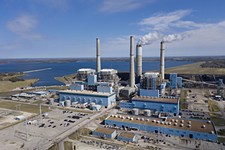Point Austin: Electric Lessons
Beneath the AE rate debate stands the strong ground of public process
By Michael King, Fri., June 15, 2012

Like everybody else in Austin, I'm not looking forward to a rate increase on my electric bill this fall. As Mike Kanin recounts in "Total Utility," the rate changes, finally ratified by City Council last week, have been a very long time coming, although for the last six months it's been fairly clear that we'd get hit one way or another. The city's major utility couldn't go on as it had, forever punting potential increases down the line to some imaginary perfect moment.
Arguably, the plan council settled on after weeks of work sessions and public discussion – and oh yes, an election campaign – is essentially the tribute politics is paying to inflation since 1994. It raises rates not nearly as dramatically as AE staff had proposed, but with the anticipation of another increase in two years and more frequent rate reviews, it creates a new tier system that should both encourage conservation and protect customers at the lower tiers of usage (and presumably income); it also expands the existing aid program for low-income citizens who need it.
GM Larry Weis summarized the changes with a sense of accomplishment: "We not only raised revenue, which is the rate increase, but more fundamentally we restructured all of the rates and moved them considerably around, and adopted rates that promote energy efficiency and that improve low-income benefits. We addressed the governance issue with the city, we addressed the transfer ... there was a lot of different pieces to it." (It's much more complicated in detail – council members and interested Austinites got a crash course in the minutiae of utility policy. For a detailed breakdown, the AE summation of the rate structure is posted below.)
Battles Ahead
All of these elements were in the works from the first days of the city discussions, although predictably it took weeks of public and private efforts to review the details, develop the changes, and most importantly, engage the public in the process. None of us is happy about rate increases, but we have ample reason to take community satisfaction from the process that determined the outcome – nothing of which would be possible if (as is advocated periodically here and at the Capitol) our municipal utility were turned over to private hands and the tender ministrations of the "free market." There may yet be a change in governance – council will be exploring the possibility of a separate AE board of directors – but other than sharing the workload, the public authority will remain ours.
We're not out of the woods yet. Out-of-city ratepayers (including some prominent Republican activists), who in the end did not get the "nonvoting" break they were agitating for, will appeal to the state Public Utility Commission, and once that process begins, there's no telling what sort of Austin-bashing, symbolic or literal, will take place at the Legislature. (Gov. Rick Perry indulged in the provincial state tradition once again at the recent state GOP convention). But in the meantime, grassroots Austin political values – transparency, equity, conservation, and most importantly, small-"d" democracy – have been honored at length, with a compromise solution we have reason to be proud of, even if we differ about particular details.
It's Our Business
That's not the only reason to be happy that we own our city utilities, of course. Without the fund transfer provided by AE, city services from public safety to parks would be increasingly strained, and property taxes would skyrocket. Those inevitable effects seldom get mentioned by the folks so devoted to the free market, like those conservative or libertarian council candidates who perennially pledge to privatize the public utilities in the service of "lower costs" – which somehow a private company whose primary purpose is to deliver dividends to its stockholders is supposed to provide. And should such an entity fail to deliver ... we can all write supplicating letters to its board of directors, or perhaps buy a few shares and raise hell at stockholder meetings.
The public process is far from perfect. It encourages political grandstanding, can become unnecessarily adversarial, eats time and money, prefers detours to straight lines, and can get bogged down in hyperbolic issues. Kanin's report of the "consumer advocate" who consumed at least as much as he advocated is a comically cautionary tale (one the city apparently hasn't yet learned; the largely redundant task is built into the new rate structure). In short, it's inevitably political in nature, for good and ill.
All this said, the democratic process is highly preferable to the sort of boardroom consensus that imposes corporate financial priorities on "consumers" – no longer citizens – under which these belated rate changes would instead have been installed by steady degrees (and decrees) over the last 18 years. Nor would the city have had any recession cushion during the last few years, via a utility surplus that enabled planning and provided reserves when direct tax revenues faltered. All this we owe to our community determination – when it comes to controlling our common resources – to be masters of our own fate.
It's often said that democracy is the worst form of government, except for all the others. The AE rate case tale is our own latest local example of that very hard-earned principle.
Posted here is the Austin Energy summation of the changes installed under the new rate structures adopted June 7 by City Council.
Got something to say on the subject? Send a letter to the editor.










